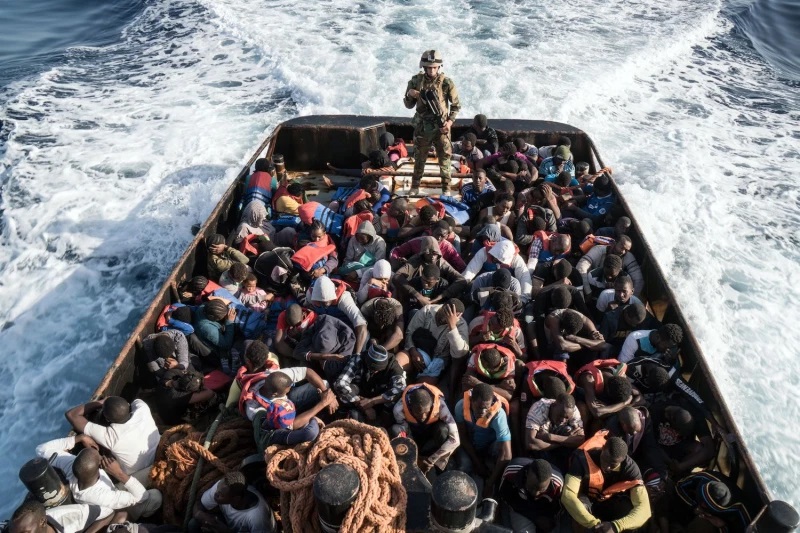How female migrants are reduced to sex slaves in Libya
But the young woman was simply diabetic.

FILE PHOTO: Irregular migrants
For Aisha, sexual slavery was something only heard about happening to others in television reports, until she found herself locked in a living “hell” in Libya.
“I had left a nightmare only to fall into hell,” said the migrant from Guinea, lured to the North African country that criminal gangs have turned into a den of racketeering.
- Fashola: Why Nigeria needs to continue borrowing
- PDP wins Kaduna assembly by-election for Sabon Gari constituency
Aisha fled her home country after five miscarriages: for her in-laws and the neighbourhood, she was either sterile or a witch.
But the young woman was simply diabetic.
“I just wanted to disappear from my country,” said Aisha, a graduate in hotel management.
She contacted a former classmate who appeared to have made a life for herself in neighbouring Libya and who lent Aisha money to join her.
“I didn’t even see the country. As soon as I arrived, I was locked up, I was a slave. She brought men to me and she got the money.”
Locked in a room with a toilet, she only saw the “friend” who had duped her when she was brought in food, “like a dog”.
“The men came drunk. I’d rather not remember it,” said Aisha, still trembling. “I thought my life was over.”
‘Wouldn’t wish that on worst enemy’

After three months, a Libyan man took pity on her, threatened her captor and put Aisha on a bus to Tunisia with 300 Libyan dinars ($65) in her pocket.
After her diabetes was treated, she even gave birth to a baby girl late last year.
She now dreams of Europe, but returning to Libya is out of the question.
“I wouldn’t wish that on my worst enemy.”
For the past two years, she has lived with other migrant women in Medenine, southern Tunisia.
Most of the others who’d experienced Libya had also been forced into prostitution, raped or sexually assaulted, said Mongi Slim, head of the local Red Crescent.
“Some of them, if they had the protection of a man, they fared better. But for single women, it’s almost systematic,” said Slim.
Some migrants said they had been advised to take a three-month contraception jab before departure, and some travel with morning-after pills, according to UN reports.
Mariam, an Ivorian orphan, left with 1,000 euros ($1,200) to pay for the crossing from Abidjan to Libya via Mali and Algeria.
She hoped to earn enough in Libya to reach Europe.
But she ended up spending most of her year there in prison, where she was sexually exploited, before fleeing to Tunisia in 2018.
“I worked for six months with a family, then I set off by sea from Zuwara,” a port in western Libya, said Mariam, 35.
“Armed men caught us, took us to prison and abused us,” she said.
Mariam said she had fallen into the hands of militiamen who run illegal migrant camps where extortion, rape and forced labour are common.
Official centres under Libyan government control, and where the European Union-funded coastguard transfers would-be exiles it intercepts, are also riddled with corruption and violence, including sexual assault, according to the United Nations.
‘Impunity’
“Every morning, a chief would make his choices and send the chosen girls to Libyans who had rented special rooms,” said Mariam.
“They fed me bread, sardines and salad. I stayed there a month until they moved me to another place,” she recalled, her voice spiked with anger.
“They were armed, they smoked drugs, they paid the chief but not me.”
According to rights groups, men and boys are also sexually abused.
“Sexual violence continues to be perpetrated with impunity by traffickers and smugglers along migration routes, in detention centres, judicial police prisons, and against urban migrants by militants and armed groups”, the United Nations said in a 2019 report.
Such criminality increased with the intensification of the Libyan conflict from 2014.
Three migrant detention centres in Libya were closed in mid-2019 and the establishment in March of a new UN-sponsored transitional government has raised hope of a decline in impunity and violence.
The UN decided last year to deploy protection officers to combat sexual crimes.
But they have yet to even be recruited, and intercepted migrants are still turned back to Libya, to the dismay of international organisations.
On June 12, a record of more than 1,000 people caught at sea were sent back to Libyan jails, according to the UNHCR.
AFP
